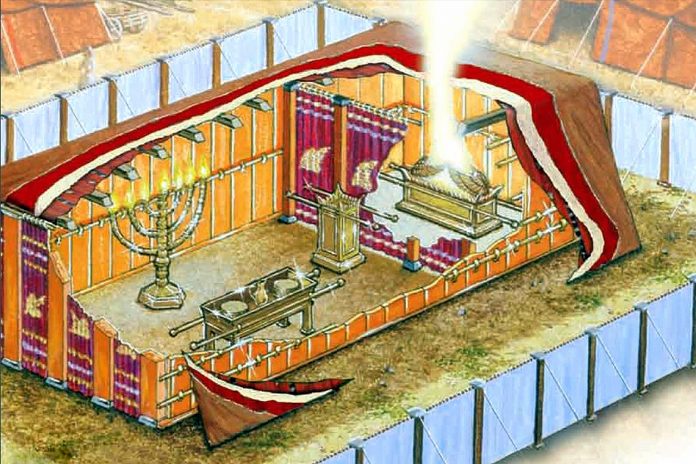
HOW TO MAKE AMENDS
The tabernacle needed to be built, and the people came forward eagerly to participate in the work.
Cloths and coverings were needed, and the people willingly made them. Precious metal was needed, “and they came, men and women, all who were willing-hearted, and they brought clasps, and earrings, and signet rings”.
So much was brought that Moses had to announce that the donors had actually brought more than enough and the giving should stop. (Modern fundraisers dream that one day they will be able to say the same thing!)
The story, with its reference to golden earrings, is reminiscent of a verse in last week’s sidra concerning the golden calf: “And all the people broke off their earrings of gold and brought them to Aaron” (Ex. 32:3).
Earrings in one story, earrings in another. But what a difference. In one case the people are committing a transgression, in the other they are performing a mitzvah. Is there a connection?
The Midrash is not slow to find one. It quotes the verse from Shir HaShirim, “I am black but comely” (1:5), and says, “When Israel made the golden calf the nations of the world said to them, ‘You black ones! What have you done?’ Israel replied, ‘If I am black in my deeds I am also comely… I was black at Horeb (Sinai) when I provoked the Lord (Deut. 9:8), but I was comely at Horeb when I said, All that the Lord has spoken will we do and hear (Ex. 24:7). I was black with the gold that I gave to the calf, and I was comely with the gold that I gave to the tabernacle.’
“Thus it is with Israel: the nations of the world scorn them, but acknowledge that they are as full of good deeds as a pomegranate.”
The Midrash pays Israel a great compliment in this passage. It also points to a crucial element in the Jewish concept of repentance.
A person must make amends with the same thing with which they committed the sin. If one sinned with money, one must make amends with money. If one sinned with speech, one must make amends with speech. If one ran to carry out questionable deeds, one must make amends by running to do mitzvot.
It is said that what made Jacob Epstein a sculptor is that as a child he used his hands to squeeze a bird to death, and realising what he had done he resolved that thereafter his hands would be used for constructive, creative purposes.
VAYAKHEL & KOHELET
The name “Vayakhel” is connected with “kahal”, a congregation. At the beginning of the sidra Moses is told to assemble the congregation.
Is there any link with the Biblical Book of Kohelet, any connection between “Kohelet” and the “kahal”?
English versions of the book tend to be called Ecclesiastes, a group assembled to hear a message, though the speaker is the leader, not a mere member, of the group.
Some translations call the book The Preacher. This indicates a leading speaker, but it is linguistically difficult since “k-h-l” does not mean to preach but to collect, gather or assemble.
Though Solomon gave a speech at the dedication of the Temple (I Kings 8:12) the book does not sound like a preachment that fulfils the usual role of a sermon, which expounds the principles of revelation and suggests that reason endorses them.
Despite the pious ending (12:13-14), Kohelet is argumentative, not exhortatory or exegetical. The book does not lecture or teach but raises discussion points and tests them. In places it tends to talk to itself. Yet the Talmudic sages (BB 15a) think that the book is a sermon or series of them.
“Why was (Solomon) called Kohelet? Because his words were spoken in public assembly – ‘bakahal’; other versions say ‘b’hak’hel’ – i.e. at the seven-yearly Hakhel assembly on Sukkot where the king recited Kohelet”.
THE BAAL SHEM TOV & THE CHACHAMIM
The Baal Shem Tov was not very impressed with a certain verse in the sidra.
The text says, “Every wise-hearted person (“chacham lev”) amongst you shall come and do all that the Lord has commanded” (Ex. 35:10).
The Baal Shem’s problem was with the word “chacham”, or rather with a particular interpretation of it. He said that when God tells you what to do you should comply without being a “chacham”.
In one sense this is a very strange argument. How can you not bring brains and wisdom (“chochmah”) to the task God sets you?
But remember that a “chacham” (especially if you pronounce it in the Yiddish way, a “chochem”) is often too clever for his own good. He can’t see things in a simple, straightforward way. He has to theorise and analyse and intellectualise. He has to make everything complicated.
If he belongs to a committee he has to formulate motions and propose amendments and set up sub-committees and refer things to the experts. He is so clever that the job is constantly postponed and never gets done.
The Baal Shem had no time for verbal shenanigans. God explained what He wanted, and the people had to get on with it.
By Raymond Apple
Rabbi Raymond Apple was for many years Australia’s highest profile rabbi and the leading spokesman on Jewish religious issues. After serving congregations in London, Rabbi Apple was chief minister of the Great Synagogue, Sydney, for 32 years. He also held many public roles, particularly in the fields of chaplaincy, interfaith dialogue and Freemasonry, and is the recipient of several national and civic honours. Now retired, he lives in Jerusalem and blogs at http://www.oztorah.com









